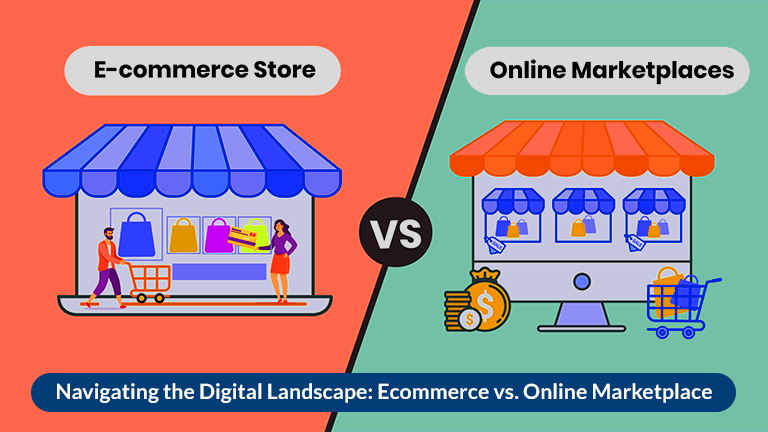Looking Back at 2025: How Ndimension Labs Evolved with Purpose
I remember standing by the window of our Kolkata office on a rainy Tuesday in early January 2025. The city…
Businesses in today’s digital age have numerous alternatives for establishing an online presence and reaching a larger client base. Setting up an ecommerce store or joining an online marketplace are two popular options.
Choosing amongst these solutions necessitates careful analysis based on your company’s goals, target audience, and available resources.
Let’s look at the elements to think about when making this option.
Ecommerce: Having your own ecommerce store allows you to have complete control over your brand identification, website design, and customer experience. You may customise the store to reflect your brand values and have greater control over pricing, promotions, and customer interactions.
Joining an online marketplace helps you to take use of an existing platform with a large consumer base. You will, however, have little control over branding and customisation. Your company will be connected with the marketplace’s brand, and you must follow their guidelines and policies.

Ecommerce allows you to focus your marketing efforts and adapt the buying experience to the preferences of your clients if you have a specific target demographic or niche market. To reach potential customers, you’ll need to invest in marketing and attracting traffic to your store.
Online Marketplace: Online marketplaces give you access to a large customer base that is already on the platform. They handle marketing, attract a wide range of clients, and frequently provide instruments for increasing awareness. This can help you save money on marketing and reach a larger audience more rapidly.
Ecommerce stores necessitate investments in website development, hosting, security, and payment gateway integration. You’ll also need to budget for marketing, inventory management, order fulfilment, and customer service.
Joining an online marketplace usually has cheaper initial fees because they offer the infrastructure. However, you may be charged listing fees, sales commissions, and additional costs for value-added services. Consider the pricing structure of the platform and the long-term profitability and sustainability of your company in the marketplace.
Ecommerce provides you with the potential to differentiate your brand and items through competition and discoverability. To drive organic traffic and increase discoverability, you’ll need to invest in SEO, content marketing, and social media initiatives. It takes time and effort to establish a strong internet presence and brand reputation.
Due of their existing user base and search functionality, online marketplaces provide greater discoverability. However, competition in the marketplace can be fierce. Your products will be featured alongside competitors, and in order to stand out, you’ll need to optimise your listings, price, and customer reviews.

Checklist:
A marketplace website brings together multiple sellers offering a diverse range of items or services. This diversity entices clients by presenting them with a plethora of options to pick from, hence improving their shopping experience.
Checklist:
Choosing between opening an ecommerce store and becoming a member of an online marketplace is a critical decision for businesses entering the digital realm. Both approaches have distinct benefits and considerations that must be aligned with your specific business objectives, resources, and target audience.
Businesses can have complete control over branding, personalization, and customer experience with ecommerce stores. This independence enables customised strategies and a distinct brand character. However, significant expenses in website creation, marketing, and customer acquisition are required. Ecommerce stores are perfect for companies who want to have a distinct online presence, cater to a certain niche, and have the resources to construct and maintain a strong online platform.
Finally, the decision between an ecommerce store and an online marketplace is determined by your business model, target audience, control preferences, resources, and growth goals. Making an informed decision requires careful evaluation of aspects such as brand control, desired audience reach, expenses, competition, and scalability.

I remember standing by the window of our Kolkata office on a rainy Tuesday in early January 2025. The city…

For years, a strong website was enough. Today? Your customers, your staff, and even your vendors are living their lives…

Building a High-Performing Hotel Booking Mobile App The days of relying solely on front-desk calls or travel agents for bookings…